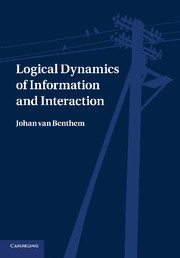Book contents
- Frontmatter
- Contents
- Preface
- Acknowledgments
- 1 Logical dynamics, agency, and intelligent interaction
- 2 Epistemic logic and semantic information
- 3 Dynamic logic of public observation
- 4 Multi-agent dynamic-epistemic logic
- 5 Dynamics of inference and awareness
- 6 Questions and issue management
- 7 Soft information, correction, and belief change
- 8 An encounter with probability
- 9 Preference statics and dynamics
- 10 Decisions, actions, and games
- 11 Processes over time
- 12 Epistemic group structure and collective agency
- 13 Logical dynamics in philosophy
- 14 Computation as conversation
- 15 Rational dynamics in game theory
- 16 Meeting cognitive realities
- 17 Conclusion
- References
- Index
1 - Logical dynamics, agency, and intelligent interaction
Published online by Cambridge University Press: 07 October 2011
- Frontmatter
- Contents
- Preface
- Acknowledgments
- 1 Logical dynamics, agency, and intelligent interaction
- 2 Epistemic logic and semantic information
- 3 Dynamic logic of public observation
- 4 Multi-agent dynamic-epistemic logic
- 5 Dynamics of inference and awareness
- 6 Questions and issue management
- 7 Soft information, correction, and belief change
- 8 An encounter with probability
- 9 Preference statics and dynamics
- 10 Decisions, actions, and games
- 11 Processes over time
- 12 Epistemic group structure and collective agency
- 13 Logical dynamics in philosophy
- 14 Computation as conversation
- 15 Rational dynamics in game theory
- 16 Meeting cognitive realities
- 17 Conclusion
- References
- Index
Summary
Logical dynamics of information-driven agency
Human life is a history of millions of actions flowing along with a stream of information. We plan our trip to the hardware store, decide on marriage, rationalize our foolish behaviour last night, or prove an occasional theorem, all on the basis of what we know or believe. Moreover, this activity takes place in constant interaction with others, and it has been claimed that what makes humans so unique in the animal kingdom is not our physical strength, nor our powers of deduction, but rather our planning skills in social interaction – with the mammoth hunt as an early example, and legal and political debate as a late manifestation. It is this intricate cognitive world that I take to be the domain of logic, as the study of the invariants underlying these informational processes. In particular, my programme of Logical Dynamics (van Benthem 1991, 1996, 2001) calls for identification of a wide array of informational processes, and their explicit incorporation into logical theory, not as didactic background stories for the usual concepts and results, but as first-class citizens. One of the starting points in that programme was a pervasive ambiguity in our language between products and activities or processes. ‘Dance’ is an activity verb, but it also stands for the product of the activity: a waltz or a mambo. ‘Argument’ is a piece of a proof, but also an activity one can engage in, and so on. Logical systems as they stand are product-oriented, but Logical Dynamics says that both sides of the duality should be studied to get the complete picture. And this paradigm shift will send ripples all through our standard notions. For instance, natural language will now be, not a static description language for reality, but a dynamic programming language for changing cognitive states.
Recent trends have enriched the thrust of this action-oriented programme. ‘Rational agency’ stresses the transition from the paradigm of proof and computation performed by a single agent (or none at all) to agents with abilities, goals, and preferences plotting a meaningful course through life. This turn is also clear in computer science, which is no longer about lonely Turing Machines scribbling on tapes, but about complex intelligent communicating systems with goals and purposes. Another recent term, ‘intelligent interaction’, emphasizes what is perhaps the most striking feature here, the role of others. Cognitive powers show at their best in many-mind, rather than single-mind settings – just as physics only gets interesting, not with single bodies searching for their Aristotelian natural place, but on the Newtonian view of many bodies influencing each other, from nearby and far.
- Type
- Chapter
- Information
- Logical Dynamics of Information and Interaction , pp. 1 - 20Publisher: Cambridge University PressPrint publication year: 2011
- 2
- Cited by



